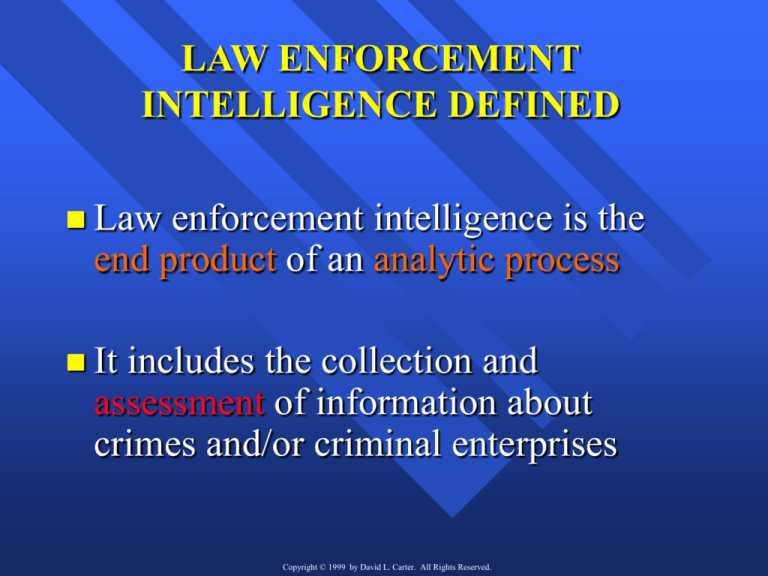
LAW ENFORCEMENT
INTELLIGENCE DEFINED
Law
enforcement intelligence is the
end product of an analytic process
It
includes the collection and
assessment of information about
crimes and/or criminal enterprises
Copyright © 1999 by David L. Carter. All Rights Reserved.
NATIONAL SECURITY
INTELLIGENCE DEFINED
National
security intelligence is the
end product of an analytic process
Concerned
with the relationship of the
United States with foreign powers,
organizations, and persons
Copyright © 1999 by David L. Carter. All Rights Reserved.
IS ALL INFORMATION
INTELLIGENCE?
No!
Until
information is processed or
analyzed it is simply data that may or
may not be true, insightful, or relevant
PASSIVE
INFORMATION
Information
Simply Awaits
Access
ANALYTIC PROCESSES
PROACTIVE
INTELLIGENCE
Copyright © 1999 by David L. Carter. All Rights Reserved.
> Forecasting
> Correlations
> Offer
Suppositions
> Direct an
Investigation
or Inquiry
THE GOALS OF
LAW ENFORCEMENT
INTELLIGENCE
Locate
evidence
Identify contraband
Direct the allocation of resources
INTELLIGENCE IS CONCERNED WITH…
Investigation
Apprehension
Crime
Prosecution
Service to
Investigators
Projections
of Future
Copyright © 1999 by David L. Carter. All Rights Reserved.
IS INTELLIGENCE USED IN
EVERY CRIMINAL
INVESTIGATION?
No
Intelligence
is used in serious or
complex cases
Intelligence may result in the
initiation of an investigation
CASE PATHOLOGY
Case
Archaeology
Case
Progression
Intelligence
Initialization
Copyright © 1999 by David L. Carter. All Rights Reserved.
CORNERSTONES OF
INTELLIGENCE OPERATIONS
EQUITY
Equitable enforcement of the law
Equal treatment under the Constitution
Equitable distribution of police services
and resources
EFFECTIVENESS
Accomplishing your goals
Achieving planned and desired results
EFFICIENCY
Not wasting resources
Providing “good value for money”
Copyright © 1999 by David L. Carter. All Rights Reserved.
ROLES OF LAW ENFORCEMENT
INTELLIGENCE
Obtaining and
Integrating Information
Identifying Crimes
and Crime Trends
Identifying
Criminals
Developing
Cases
Providing
Investigative Support
Projecting
Crime Trends
Copyright © 1999 by David L. Carter. All Rights Reserved.
CLASSIFICATIONS OF LAWINT
SCOPE OF ANALYTIC ACTIVITY
Macro-Intelligence
Micro-Intelligence
Copyright © 1999 by David L. Carter. All Rights Reserved.
CLASSIFICATIONS OF LAWINT
SCOPE OF ANALYTIC ACTIVITY
Macro-Intelligence
Micro-Intelligence
CRIMINAL CASE RESPONSIBILITY
General
Specialized
Copyright © 1999 by David L. Carter. All Rights Reserved.
CLASSIFICATIONS OF LAWINT
SCOPE OF ANALYTIC ACTIVITY
Macro-Intelligence
Micro-Intelligence
CRIMINAL CASE RESPONSIBILITY
General
Specialized
INTELLIGENCE APPLICATIONS
Tactical
Operational
Strategic
Copyright © 1999 by David L. Carter. All Rights Reserved.
LAW ENFORCEMENT INTELLIGENCE
Crime
Driven
NATIONAL SECURITY INTELLIGENCE
Copyright © 1999 by David L. Carter. All Rights Reserved.
LAW ENFORCEMENT INTELLIGENCE
Crime
Driven
Constitutional
Rigidity
NATIONAL SECURITY INTELLIGENCE
Copyright © 1999 by David L. Carter. All Rights Reserved.
LAW ENFORCEMENT INTELLIGENCE
Crime
Driven
Constitutional
Rigidity
Judicial
Scrutiny
NATIONAL SECURITY INTELLIGENCE
Copyright © 1999 by David L. Carter. All Rights Reserved.
LAW ENFORCEMENT INTELLIGENCE
Crime
Driven
Judicial
Scrutiny
Constitutional
Rigidity
Presidential
Policy Driven
NATIONAL SECURITY INTELLIGENCE
Copyright © 1999 by David L. Carter. All Rights Reserved.
POPULAR MYTHS ABOUT
LAW ENFORCEMENT INTELLIGENCE
Public demand for police services, particularly 911
rapid-response services, is largely out of police
control, thereby limiting abilities to do other work.
Police department resources are, in the main, already
deployed to best advantage, efficiently and effectively.
Intelligence is a discretionary “add on” to the core job
of policing.
Intelligence is a risky enterprise that is largely
inefficient and “borders on the edge of unlawfulness.”
Copyright © 1999 by David L. Carter. All Rights Reserved.
THE IMPACT OF 09-11-01
ON LAW ENFORCEMENT
INTELLIGENCE
Executive
Office of Homeland
Security
USA Patriot Act of 2001
Need and Value of Intelligence
Not Recognized
REASONS
POLICE
HAVE
BEEN
RELUCTANT
TO
CREATE
FULLSERVICE
INTELUNITs
Limited Body of Research
Knowledge in Law Enforcement
Intelligence as a Management
Resource Not Recognized
Paramilitary/Bureaucratic Police
Structure Inhibits Intelligence
Law Enforcement is Usually
Reactive—Intelligence is Proactive
Intelligence is Multidisciplinary—
Policing Is Largely Unidisciplinary
Past Abuses of Intelligence
Make Police Defensive
Copyright © 2001 by David L. Carter. All Rights Reserved.
MANAGEMENT ISSUES
Unity
of Command
– Balancing competing interests
– Political considerations
Staffing
– Mixture of sworn and civilian employees
– Role of civilians as advisors to sworn officers
ADVANTAGES OF CIVILIAN
INTELLIGENCE ANALYSTS
Characteristics,
background, and
education
“Street” experience may narrow an
analyst’s view
Longevity in the unit
Analysts do not require law
enforcement authority
DISADVANTAGES OF
CIVILIAN ANALYSTS
Lack
of mobility
Relationship to officers
THE INTELLIGENCE CYCLE
An
organized process by which
information is gathered,
assessed, and distributed in
order to fulfill the goals of the
intelligence function
It
is a method of performing
analytic activities and placing
THE INTELLIGENCE CYCLE
Requirement
Collection
Evaluation
Collation
Analysis
Reporting
Dissemination
The Intelligence Cycle
Overt
Sources
Source Reliability
COLLECTION
Covert
Sources
COLLATION
EVALUATION
Information Validity
Information
Segregation
Index &
Storage
ANALYSIS
Conclusions
Estimates
REPORTING
DISSEMINATION
Predictions
Tactical
FEEDBACK
AND
RE-EVALUATION
Strategic
Periodic
Routine
Distribution
Response to
Requests







